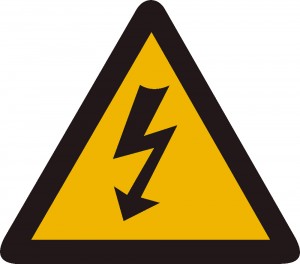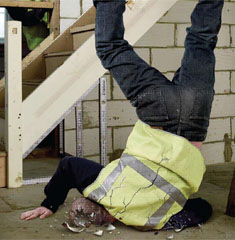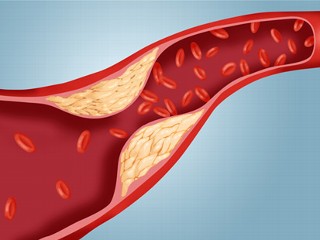 Healthy aging is a hot topic for baby boomers everywhere. Whether you’re concerned about weight gain, sex drive or chronic diseases, the key to healthy aging is a healthy lifestyle. Eating a variety of healthy foods, practicing portion control and including physical activity in your daily routine can go a long way toward promoting healthy aging. Better yet, its never too late to make healthier lifestyle choices.
Healthy aging is a hot topic for baby boomers everywhere. Whether you’re concerned about weight gain, sex drive or chronic diseases, the key to healthy aging is a healthy lifestyle. Eating a variety of healthy foods, practicing portion control and including physical activity in your daily routine can go a long way toward promoting healthy aging. Better yet, its never too late to make healthier lifestyle choices.
Month: May 2012
Electrical Safety
 Electrical hazards can cause burns, shocks and electrocution (death).
Electrical hazards can cause burns, shocks and electrocution (death).
- Assume that all overhead wires are energized at lethal voltages. Never assume that a wire is safe to touch even if it is down or appears to be insulated.
- Never touch a fallen overhead power line. Call the electric utility company to report fallen electrical lines.
- Stay at least 10 feet (3 meters) away from overhead wires during cleanup and other activities. If working at heights or handling long objects, survey the area before starting work for the presence of overhead wires.
- If an overhead wire falls across your vehicle while you are driving, stay inside the vehicle and continue to drive away from the line. If the engine stalls, do not leave your vehicle. Warn people not to touch the vehicle or the wire. Call or ask someone to call the local electric utility company and emergency services.
- Never operate electrical equipment while you are standing in water.
- Never repair electrical cords or equipment unless qualified and authorized.
- Have a qualified electrician inspect electrical equipment that has gotten wet before energizing it.
- If working in damp locations, inspect electric cords and equipment to ensure that they are in good condition and free of defects, and use a ground-fault circuit interrupter (GFCI).
- Always use caution when working near electricity.
via Electrical Safety.
How can you avoid stress?
 Stress is a fact of life for most people. You may not be able to get rid of stress, but you can look for ways to lower it.
Stress is a fact of life for most people. You may not be able to get rid of stress, but you can look for ways to lower it.
You might try some of these ideas:
- Learn better ways to manage your time. You may get more done with less stress if you make a schedule. Think about which things are most important, and do those first.
- Find better ways to cope. Look at how you have been dealing with stress. Be honest about what works and what does not. Think about other things that might work better.
- Take good care of yourself. Get plenty of rest. Eat well. Don’t smoke. Limit how much alcohol you drink.
- Try out new ways of thinking. When you find yourself starting to worry, try to stop the thoughts. Work on letting go of things you cannot change. Learn to say “no.”
- Speak up. Not being able to talk about your needs and concerns creates stress and can make negative feelings worse. Assertive communication can help you express how you feel in a thoughtful, tactful way.
- Ask for help. People who have a strong network of family and friends manage stress better.
via Stress – Manage Your Stress, Measure Your Stress, and Reduce Your Stress.
Forklift Safety
 Each year, tens of thousands of injuries related to powered industrial trucks (PIT), or forklifts, occur in US workplaces. Many employees are injured when lift trucks are inadvertently driven off loading docks, lifts fall between docks and an unsecured trailer, they are struck by a lift truck, or when they fall while on elevated pallets and tines. Most incidents also involve property damage, including damage to overhead sprinklers, racking, pipes, walls, and machinery. Unfortunately, most employee injuries and property damage can be attributed to lack of safe operating procedures, lack of safety-rule enforcement, and insufficient or inadequate training.
Each year, tens of thousands of injuries related to powered industrial trucks (PIT), or forklifts, occur in US workplaces. Many employees are injured when lift trucks are inadvertently driven off loading docks, lifts fall between docks and an unsecured trailer, they are struck by a lift truck, or when they fall while on elevated pallets and tines. Most incidents also involve property damage, including damage to overhead sprinklers, racking, pipes, walls, and machinery. Unfortunately, most employee injuries and property damage can be attributed to lack of safe operating procedures, lack of safety-rule enforcement, and insufficient or inadequate training.
Never Leave Your Child Alone in a Car
 You might be surprised to hear that a child can die from heat stroke on a 72-degree day. There’s a medical reason why this happens to children – their bodies aren’t the same as adults. A child’s body can heat up five times faster than an adult’s.
You might be surprised to hear that a child can die from heat stroke on a 72-degree day. There’s a medical reason why this happens to children – their bodies aren’t the same as adults. A child’s body can heat up five times faster than an adult’s.
Now think of how your car usually feels warmer inside than out. Did you know that even on a mild day, the temperature inside a car can rise 20 degrees in just 10 minutes? On an 80-degree day, the inside of a closed car can quickly reach 100 degrees in the time it takes to run into the store for an errand. Heat stroke happens when the body cannot cool itself fast enough and the core temperature rises to dangerous levels.
Prevent Fall Injuries in the Workplace
 Falls are a persistent hazard found in all occupational settings. A fall can occur during the simple acts of walking or climbing a ladder to change a light fixture or as a result of a complex series of events affecting an ironworker 80 feet above the ground. According to the 2009 data from the Bureau of Labor Statistics, 605 workers were killed and an estimated 212,760 workers were seriously injured by falls to the same or lower level.
Falls are a persistent hazard found in all occupational settings. A fall can occur during the simple acts of walking or climbing a ladder to change a light fixture or as a result of a complex series of events affecting an ironworker 80 feet above the ground. According to the 2009 data from the Bureau of Labor Statistics, 605 workers were killed and an estimated 212,760 workers were seriously injured by falls to the same or lower level.
via CDC – Fall Injuries Prevention in the Workplace – NIOSH Workplace Safety and Health Topic.
Mary Ball Washington – Mother of Our Country
Lowering LDL Cholesterol
 Do you know your cholesterol numbers? They are too high for more than half of all American adults. The culprit is LDL cholesterol—low-density lipoproteins, the bad kind—in their blood. Manufactured by the liver, cholesterol is a critical building block of cell walls, hormones, and digestive juices. But overly high LDLs are a major cardiovascular risk. Along with liquified fat, dead cells, and other cellular trash, they can form deposits within the walls of the coronary arteries; as these deposits, or plaques, grow, they may bulge into the artery, interfering with blood flow. If one ruptures and a clot forms, a heart attack or stroke is likely. If you haven’t had your cholesterol checked with a quick blood test, now would be a good time. Adults are advised to get their levels tested at least once every five years.
Do you know your cholesterol numbers? They are too high for more than half of all American adults. The culprit is LDL cholesterol—low-density lipoproteins, the bad kind—in their blood. Manufactured by the liver, cholesterol is a critical building block of cell walls, hormones, and digestive juices. But overly high LDLs are a major cardiovascular risk. Along with liquified fat, dead cells, and other cellular trash, they can form deposits within the walls of the coronary arteries; as these deposits, or plaques, grow, they may bulge into the artery, interfering with blood flow. If one ruptures and a clot forms, a heart attack or stroke is likely. If you haven’t had your cholesterol checked with a quick blood test, now would be a good time. Adults are advised to get their levels tested at least once every five years.
May is Motorcycle Safety Awareness Month
 Motorcycles are vehicles with the same rights and privileges as any motor vehicle on the roadway. Motorcycle Safety Awareness Month is a national initiative aimed at getting motorists and motorcyclists to “share the road” with each other.
Motorcycles are vehicles with the same rights and privileges as any motor vehicle on the roadway. Motorcycle Safety Awareness Month is a national initiative aimed at getting motorists and motorcyclists to “share the road” with each other.
via Motorcycles | National Highway Traffic Safety Administration (NHTSA).
Smoking Cuts Life Short
Tobacco use is the leading preventable cause of death.
Worldwide, tobacco use causes more than 5 million deaths per year, and current trends show that tobacco use will cause more than 8 million deaths annually by 2030.
In the United States, tobacco use is responsible for about one in five deaths annually (i.e., about 443,000 deaths per year, and an estimated 49,000 of these smoking-related deaths are the result of secondhand smoke exposure).
On average, smokers die 13 to 14 years earlier than nonsmokers.


